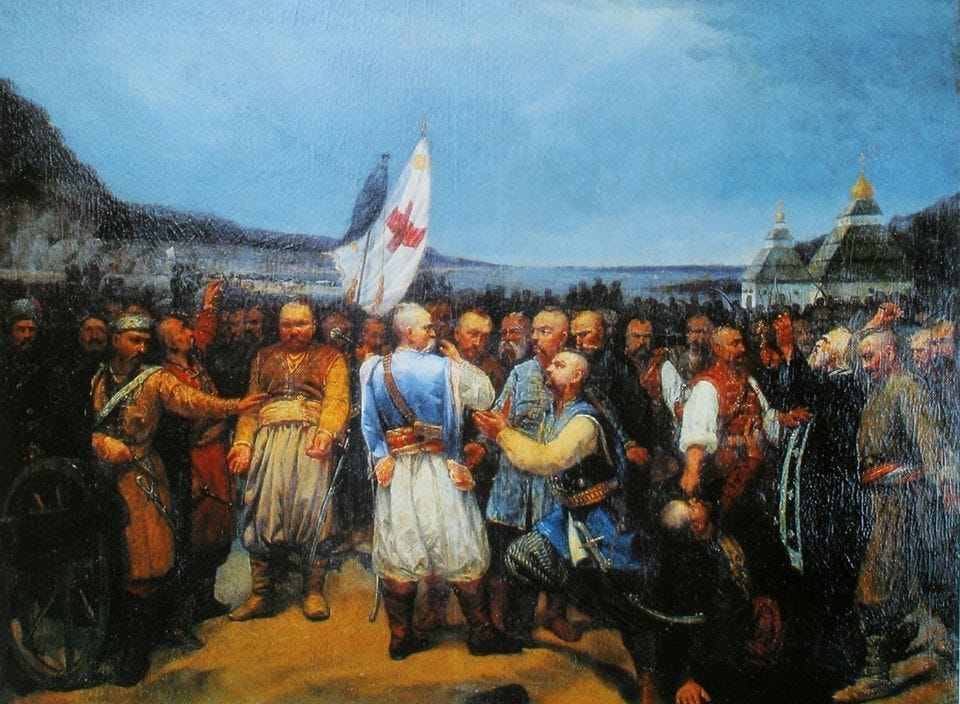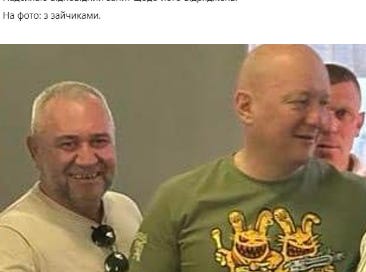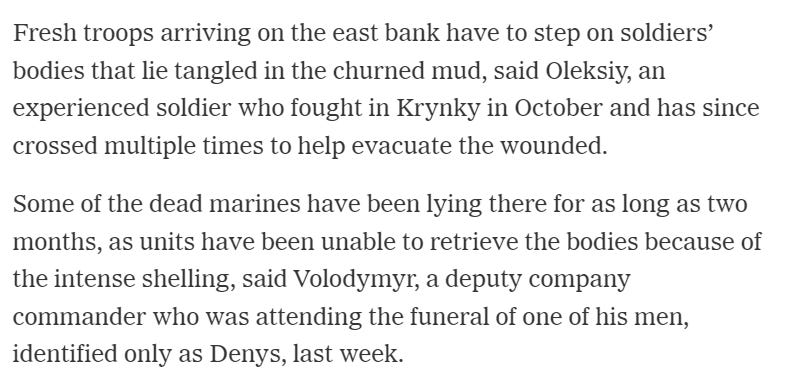General Sodol versus Azov
The Mariupol roots of Azov's anti-Sodol crusade, the clock ticks for Syrsky.
The news has already flashed across western media that Lieutenant General Yurii Sodol has been sacked after criticism from Major Bohdan Krotevych of the Azov Brigade. In today’s post, I’ll be looking at the reasons behind problems between Azov and Sodol, which certainly didn’t arise recently.
To begin, here is a translation of Krotevych’s June 24 post:
Ālea iacta est. [The dice has been cast]
I am quite a sentimental person, to some extent empathetic. Knowing that there is a war in Ukraine, having a responsibility to the country, society, and fellow soldiers, I try to solve various problems in a way that does not harm anyone. And, as I have said, I truly believe in a conscious form of diplomacy where you can logically explain to people where they are wrong and what it could lead to. In return, these people can give you answers. Even if they act deliberately and are villains, diplomacy can solve the problem with a 'lesser evil,' through barter, an agreement - that, in my opinion, is the essence of diplomacy. Therefore, every significant problem, which sometimes is not advisable to spread publicly, I always try to convey to those who can influence it.
But sometimes it happens that most don't care. Like, for example, not caring about failed internal communication. Sometimes it seems that in communicating with Americans and other Western partners, some completely forget about their own people and troops. I call this form of communication 'freezing.' And perhaps, if I were interested in personal gain, I would keep silent, because it almost does not affect me at this moment. But it affects the victory of Ukraine in the war (or rather, its postponement). Therefore, I openly declare - I tried (not just me, it's a fact, but I speak for myself), said in offices, passed information to all who could. Moreover, while giving testimonies on cases I cannot discuss, I directly stated what I consider to be 'war crimes.' But, apparently, most don't care.
All this to say - I wrote a letter to the State Bureau of Investigation calling for an investigation against a military general who, I believe, has killed more Ukrainian soldiers than any Russian general. I don't care if they start an investigation against me and I don't care if they put me in jail. I do care that commanders are tried for losing an observation post, but the general is not tried for losing regions and dozens of cities and the loss of thousands of soldiers. The conditions under which the brigades are fighting now, I would say, are unreal heroism, primarily of the soldiers, platoon, company, battalion, and brigade commanders. And their heroism lies in the fact that they hold back the enemy not thanks to, but despite.
Sometimes it seems to me that the world sends us scoundrels to unite us. And all the military understand now, about whom I speak, because 99 percent of the military hate him for what he does. This person initiates investigations against commanders who advance and do not lose positions, but he does not initiate service investigations against himself.
I'm fed up, the Rubicon has been crossed. You need to understand that soldiers often resort to media publicity of their operations not because everything is going swimmingly. Unfortunately, that's the form of government we have. At the moment, it is, damn it, the only possibility to change the situation. I don't care a bit about myself. And the only thing I will always be ashamed of is that I didn't do this earlier. Fortune favors the bold, and some creatures benefit from the fact that most remain silent understanding the consequences of a 'personal vendetta' against themselves and their units. Therefore, I note that this is my personal decision and I fully accept the consequences.
A win for civil society
The patriotic military blogger Yury Butusov also put out a long video on the topic of the Sodolov affair on the 25th.
His commentary is particularly interesting. Naturally, Butusov sings the praises of Azov, and begins by describing the sacking of Sodol’ as a momentous event, one the signals the rising power of military civil society as against decrepit bureaucracy. He put particular importance on the split between responsible officers and soldiers at the front, exemplified by Azov, and corrupt, incompetent top military generals, exemplified by Sodol and Syrsky.
I would add in this respect to stress the military part of military democracy - in their streams and interviews, acting servicemen are often full of resentment towards ‘lazy civilians’, who hide from the front and prefer to whine and party rather than head to the trenches.
Butusov also claims that Ukraine’s strength as opposed to Russia is its strong civil society, which the Sodol dismissal demonstrates. I would wonder how much of a healthy phenomenon it is for military discipline to be violated in such a way, but what do I know.
Bad Blood
Butusov then goes onto the causes of Sodolov’s dismissal. Butusov bases his story on his long-standing contact with Azov, including in the period of the war for Mariupol back in early to mid 2022. It is to this battle that Butusov turns to explain the roots of bad blood between Sodol and Azov.
Back then, Sodol was in charge of the defense of the strategically crucial Mariupol. Not that he did very well - Butusov notes that on the first day of the war on 24 February 2022, the Russian army pushed a whole 100 kilometres forward, crossing the Dnepr river and taking Energodar, Tokmak and Melitopol. By the 26th, they had taken Berdyansk (one of the top comments on Butusov’s video is a resident of Berdyansk who accuses Sodol of selling the city to the Russians), and by this point it became clear that Mariupol was surrounded.
And at this point Sodol - and the military/political leadership as a whole - sharply disagreed with Azov. The Russian army was entering the rear of Mariupol. The leadership of Azov contacted Sodol and asked what to do - as befitted military hierarchy. To fight in total encirclement, or to make an effort to escape?
There were two major military units in the city - the 12th brigade of the National Guard, which included Azov, and the 36th marine infantry brigade. One 24th of February, Sodol held a meeting to determine a plan for defense of the city. But Butusov - and, in his words, Azov - claims that Sodol failed to delineate responsibility. As a result, there was constant confusion, miscommunication and chaos among the Ukrainian units in the city. After that, he left the city for his command point in Ugledar.
Feeling abandoned, Denis Prokopenko, the commander of the Separate special purpose unit "Azov” of the 12th brigade, took control of the defense of the city on the first day of the war. But since this was an independent decision, Butusov claims Prokopenko was unable to gather the resources needed to defend the city - he lacked food, medications and ammunition supplies.
Butusov claims they only had 80 artillery shells on paper. Butusov does admit that Azov had in any case made some ‘illegal weapon caches’, which itself raises its own questions, but does at least answer the question of how Azov was able to continue fighting from February until May. They apparently also took the weapons of several retreating military units, such as the 56th.
Before fighting started in Mariupol proper, Prokopenko proposed to Sodol that the Ukrainian army take the fight to the Russians at, say, Berdyansk, so as to prevent or at least slow down the encirclement of Mariupol. But Sodol did not allow this.
Azov apparently pleaded with Sodol to allow retreat from the city, given that its defense in conditions of encirclement would mean enormous losses with no hope of victory. Butusov notes that Sodol’s refusal could not have only been his initiative, and must have been agreed upon with Zaluzhny and Zelensky.
Butusov admitted that while there are cases where an order to hold territory at any cost can be necessary, the lack of adequate fortification and military supplies raises obvious questions regarding Sodol.
At the end of March, following constant criticism by Prokopenko and Azov’s other leaders, Sodol was removed from his position as the commander of the AFU’s southern forces. But in May, after Azov laid down its weapons in the depths of Mariupol and its leaders were sent into Russian captivity, Sodol returned to take the post of commander of marine infantry, where his forces played a ‘questionable’, in Butusov’s words, role in counter-attacks around Donetsk and Opytne.
Butusov also criticizes Sodol’s forces in their attacks in June-September 2023 due to the huge losses they made for little real results against superior Russian forces. After that, Sodol played a significant role in the Krynky debacle. This is an island on the Dnepr river in the Kherson region, which Ukrainian forces tried to take and retake for months on end, endlessly battered by Russian forces on the other side of the river, for no clear military end. The New York Times even wrote an article describing it as a ‘suicide mission’ back in December 2023.
Butusov called the Krynky affair ‘undoubtedly a story of heroism, but one which was impossible to transform into an operational success’, given the ratio of forces and the degree of losses sustained.
But Butusov notes that this did not decrease Zelensky’s faith in Sodol. After Zaluzhny’s firing, Sodol’s friend Syrsky was made head of the army. And Sodol also experienced a career lift, now becoming commander of the united forces, as well as commander of the Khortytsia operational-strategic group, which is responsible for the majority of the front and most soldiers. Before taking the latter post, it was occupied by Syrsky.
Butusov argues that Sodol’s old methods worked even worse at this new, higher level. He earned the hatred of the majority of soldiers due to his tendency to send subordinates into meaningless attacks and communicate through threats and commands. He also had a love for service investigations, which Butusov states were made simply to intimidate and keep subordinates under control.
Sodol’s new post at Khotytsya also meant that he was back with his old ‘friends’, Azov. They are fighting in the Serebianski forest in the Lyman region. Sodol, feeling favored by Zelensky and Syrsky, began asserting his dominance. He initiated a range of investigations against Azov’s forces, which Butusov claims were due to Azov’s refusal to obey ridiculous commands to hold irrelevant villages or blockposts, naming the village of Ivanivka as an example.
Against Prokopenko, newly returned from Russian captivity and then Turkey, Sodol opened no less than two investigations. Butusov notes that these military investigations hold the possibility of leading to criminal prosecution, but were made on absurd bases, that Azov did not correctly implement a command.
Butusov argues that such affairs demonstrate that ‘there are two castes at the front - the caste of the Generals and the caste of those commanders responsible for their frontline soldiers. The former apparently only feel responsibility to torment the latter. The cause - ‘Zelensky and his entourage don’t care about putting people in charge which prioritize the war’. This is in turn intensified by the Generals, who ‘have an instinctive fear of politics, and do whatever they are told by political leadership’.
‘As a result, the war is bureaucratizing, no one cares about the result. They don’t care about destruction of the enemy, but only about points on a map. They don’t care at what cost x objective is achieved, with what results.’ But since commanders like those of Azov don’t only care about points on a map, but also ‘the condition of their soldiers, and what the enemy is doing at the frontline, a conflict emerged’.
Implications
All the aforementioned led to Krotevych’s social media post and appeal to the State Bureau of Investigations. Faced with this case, the first in the army’s history, Butusov notes that Zelensky paused for several days to judge public opinion. He was faced with a choice - either remove Krotevych, or Sodol. And the lack of public support for the former, as well as the relative lack of support for him in the army, led to Zelensky’s ultimate decision.
But it’s obvious that the Sodol affair isn’t the end of the story. Butusov, as well as a range of other analysis I’ve seen on telegram, notes the closeness between Sodol and Syrsky. The removal of Sodol, in Butusov’s words, raises the question of Syrsky’s removal. The latter uses just the same blunt methods as Sodol, which earned him the nickname of ‘the Butcher’ among Ukrainian troops - and not because the enemy fears him. And Butusov also notes that Sodol’s replacement, Gnatov, is just as ‘obsessed with maps’ as the other Generals. Butusov calls for ‘systemic changes’, whatever that means.
In fact, there are plenty of signs pointing to Syrsky’s imminent removal. He was put in as Zelensky’s yes-man to replace the worryingly popular Zaluzhny. The latter was just as much an ‘incompetent Soviet general’ as Syrsky or Sodol, as the nationalists like to say. But the different was probably just that a range of oppositional political forces, as well as possible the west, chose Zaluzhny as a possible icebreaker against Zelensky.
In recent weeks, Marianna Bezuhla, the attack dog parliamentarian whose vocal criticism of Zaluzhny was one of the warning bells that presaged his removal, has been just as viciously savaging Syrsky. On June 25, she accused Sodol of engaging in drunken debauches in Odessa while the Russians took Toretsk recently.
She’d already criticized Sodol for Toretsk back on June 21. And on June 8, she attacked Syrsky for ‘lying about Krynky and Rabotino’, which she stated were under Russian control despite military claims to the opposite, and that the efforts to take and hold them had been bloody and meaningless. And on June 22, she took the offensive against Syrsky again, saying in an interview that his actions demonstrate ‘classic Soviet methods’ (which is, of course, meant to sound horribly negative).
Sodol’s departure is certainly not the last shakeup the AFU will experience. But besides personnel changes, which happen in any army, one must wonder what kind of precedent is being set by a return to Cossack-style direct democracy. Given that the alternatives to Sodol and Syrsky are more of the same, what are the ‘systemic changes’ proposed by Butusov? Put Azov in charge of everything? Now that Mustafa Naiem is out of a job, maybe he could put his magic to work fighting corruption in the army?

And what will this mean for the motivation of soldiers at the front, who now comprise 3:1 mobilized to volunteers? Given their already low motivation, many having been dragged over in buses with beatings to seal the deal, will constant scandals and command shake-ups increase their willingness to fight against a vastly militarily superior enemy? Most soldiers interviewed by Ukrainska Pravda and others speak of a 7:1 ammunition superiority by the Russian army, one that will only be slightly reduced by the resumption of western aid.
Another fascinating phenomenon is the increased incidence of pro-ceasefire sentiment and criticism of the government’s ‘1991 borders or bust’ line among the most hardened nationalists, including figures in or close to Azov. But that’s for another post.








I know the point of the article is the growing influence of Azov as a political force. But if the accounts by Butusov are true, I can't help but wince in disgust. The incompetence of Sodol and Co and Putin and Co's own bellicosity in service of maintaining their regime turned Azov into the 300 Spartans while the people of Mariupol had to die, flee and see their city turned to dust. There's a lesson there about the true horseshoe theory being antagonistic nationalists and securitocratic goons.
On the last point of Azovites abandonding the 1991 borders idea; Gregoris Ioannou's ''The normalisation of Cyprus' partition among Greek Cypriots : political economy and political culture in a divided society'' might be an interesting comparative read (though possibly hard to find). I always found that comparing Ukraine to Cyprus is better than comparing it to Palestine due to the nature of the conflict (though the economic and geopolitical background is indeed quite different).